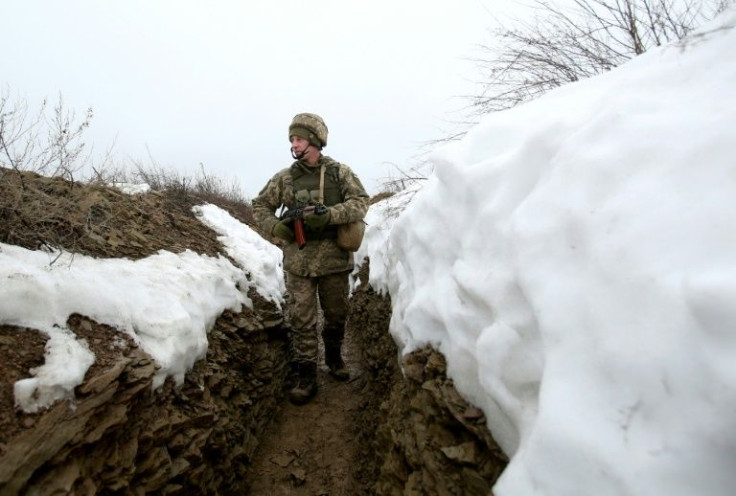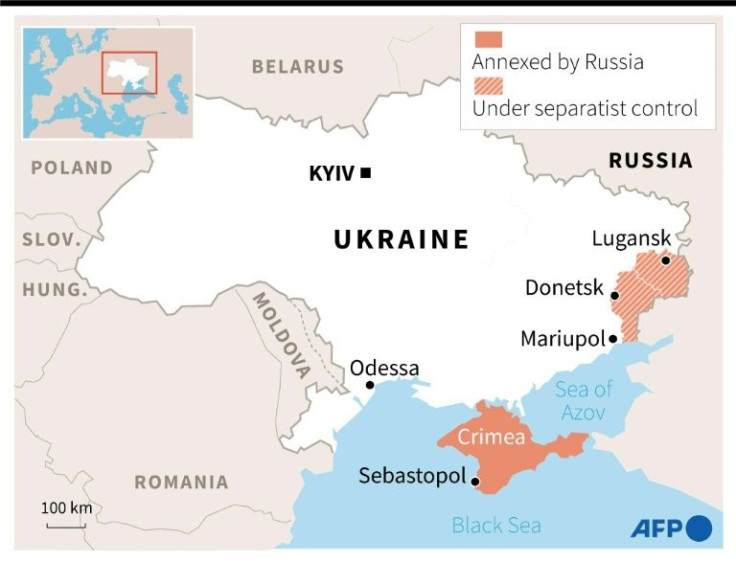OSCE Says Dialogue 'Imperative' To Defuse Ukraine Crisis
The world's largest security body on Thursday called for "imperative" dialogue to defuse the mounting crisis on Ukraine's border where Russian troops have massed, sparking fears of war.
The West has accused Russia of deploying tanks, artillery and about 100,000 soldiers on Ukraine's war-torn eastern border in recent weeks, in what NATO says is preparation for an invasion.
But Moscow says this is a response to what it sees as the growing presence of NATO in its sphere of influence, where it fiercely opposes the expansion of the Atlantic alliance.
Moscow and Washington underlined their "fundamental" differences on European security during tense talks in Geneva and Brussels earlier this week.
On Thursday, the Organization for Security and Co-operation in Europe (OSCE), whose member states include Russia and the United States, opened the first meeting of its permanent council this year, attended by all 57 member states.
Helga Schmid, the OSCE secretary general, said the situation in the region was "perilous", noting "the urgent need to reinvigorate the debate on European security".

"It is imperative we find a way through diplomacy to deescalate and begin rebuilding trust, transparency and cooperation," she said, opening the Vienna-based body's meeting.
Foreign Minister Zbigniew Rau of Poland, which chairs the OSCE this year, said the tensions posed a "challenge" for the organisation, a multilateral forum for East-West discussions founded during the Cold War's detente phase.
"It seems that the risk of war in the OSCE area is now greater than ever before in the last 30 years," he said.
Russia's representative to the OSCE, Alexander Lukashevich, said his country had expected more "substantial, in-depth discussions".
"To a very great extent it's a disappointment," he said, adding Russian President Vladimir Putin would be briefed and "determine the level of readiness to take any further steps, in what format and in what time frame."

Earlier on Thursday, Russian Deputy Foreign Minister Sergei Ryabkov said in an interview with the Russian-language channel RTVI that he did not "see reasons to sit down in the coming days, to gather again and start the same discussions".
Michael Carpenter, US ambassador to the OSCE, said the process of engagement was just beginning with the OSCE trying to further the diplomatic push.
"We never expected that there would be some kind of agreement today. Today is the announcement of the beginning of a process," he told reporters.
EU foreign policy chief Josep Borrell said Thursday that there should be no negotiations with Russian authorities over the fate of Ukraine so long as Moscow is massing troops at the country's border.
"Russian movements are part of the pressure," Borrell told journalists ahead of a meeting of EU ministers, insisting that there "should not be negotiation under pressure."
UN Secretary-General Antonio Guterres, however, said it was "absolutely essential that the dialogue that is taking place find a way allowing for de-escalation of tension... to avoid any kind of confrontation that will be a disaster for Europe and for the world".
"What we need is to make sure that we create conditions for peace and stability in Europe," he told reporters in New York.
Talks are complicated by the unclear situation on the ground in rebel-held eastern Ukraine, where the OSCE has since 2014 been charged with ensuring peace accords are respected.
But that has failed to end fighting in the region, with conditions degrading for OSCE observers in areas controlled by pro-Russian separatists, a situation the US ambassador called "extremely worrying".
"The monitoring missions have not yet recorded anything anomalous," Carpenter said earlier, while admitting that on the border "we cannot possibly know what is actually happening".
NATO chief Jens Stoltenberg also expressed his concern on Wednesday, saying the risk of conflict was "real", and urged Russia to de-escalate.
© Copyright AFP {{Year}}. All rights reserved.





















